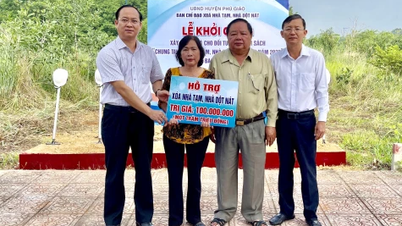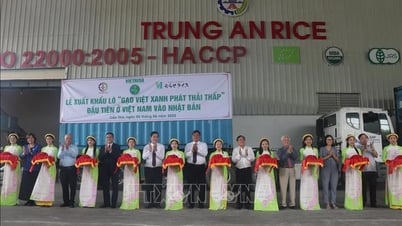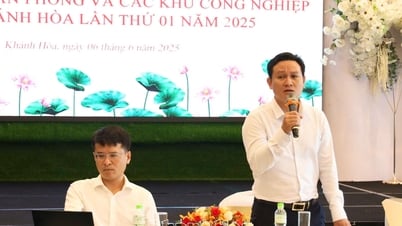Remove the blockage
Pursuant to Resolution No. 68-NQ/TW dated May 4, 2025 of the Politburo on private economic development, many specific support policies for private enterprises have been approved by the National Assembly.
Resolution No. 198/2025/QH15 of the National Assembly on a number of special mechanisms and policies for private economic development clearly states that enterprises in the private economic sector, business households, and individual businesses are supported by the State with an interest rate of 2% when borrowing capital to implement green, circular projects and apply the environmental, social, and governance (ESG) standards framework. This is an important content to remove major obstacles for private enterprises, including micro-enterprises, business households, and individual businesses, who are limited in resources and have difficulty borrowing capital, especially capital for investment in high-cost, long-term fields.
Dr. Nguyen Xuan Thanh, senior lecturer at the Fulbright School of Public Policy and Management, said that Vietnam is facing an urgent need to re-boost growth, in which the development of the private sector cannot stop at political messages, but requires specific institutional breakthroughs. Resolution No. 139/NQ-CP of the Government on the implementation plan of Resolution No. 198/2025/QH15 of the National Assembly has proposed many approaches to resources, such as access to land...
Regarding access to capital, according to Dr. Thanh, it is necessary to diversify credit channels, create conditions for the private economic sector to access capital sources, open up the corporate bond market, amend the law to expand the subjects of support and simplify loan procedures.
Pointing out the current “bottleneck” in implementation, Dr. Thanh emphasized: “Support must come from real resources, avoid repeating the mechanism of asking and giving, and absolutely should not create additional cumbersome monitoring apparatus.”
Associate Professor, Dr. Nghiem Thi Tha, General Secretary of the Vietnam Financial Consulting Association (VFCA), also said that in order for the private economic sector to develop sustainably, it is necessary to effectively and substantially unblock capital flows (both short-term and long-term). Regarding short-term capital sources, the private economic sector accounts for about 50% of the total outstanding loans of the entire banking system. However, small and medium-sized enterprises still have to pay commercial loan interest rates of about 9-11%/year, higher than the average in the ASEAN region (6-7%/year); the major difficulty lies in the ability to access credit, especially for individual business households.
Capital release
In order to improve access to capital for private enterprises and support this sector to make a breakthrough, the State Bank of Vietnam said it will continue to operate a proactive monetary policy, control inflation, stabilize exchange rates, stabilize interest rates, contribute to creating a stable business environment; monitor, inspect and examine banks that increase deposit and lending interest rates.
According to experts, to improve access to credit capital, private enterprises need to increase transparency in financial management, especially accounting books, and strengthen governance capacity.
Data from the State Bank of Vietnam shows that by April 2025, the average lending interest rate for new transactions of banks will decrease by 0.6%/year compared to the end of 2024, creating conditions for private enterprises to reduce capital pressure in production and business. For 5 priority sectors (export, agriculture, high technology, small and medium enterprises, supporting industries), lending interest rates are stable at 4%/year.
Mr. Tu Tien Phat, General Director of ACB, said that the mechanism to support 2% interest rates for small businesses, innovation and ESG application is very necessary, but in reality, the implementation still faces many barriers, both from banks and businesses. Therefore, it is necessary to have more synchronous solutions, reduce administrative procedures, digitize credit granting processes and develop a more detailed green credit framework. “As a private bank, we understand the transformation process of the private economic sector. Businesses are very willing to invest and innovate, but they need to see the specificity and transparency in policies,” Mr. Phat shared.
At Agribank, the total outstanding loans of the Bank currently reach more than 1.7 million billion VND, of which more than 60% are allocated to the agricultural, rural and farmer sectors, with the main customer group being private economic households. Agribank Deputy General Director Phung Thi Binh said that of the nearly 500,000 billion VND of outstanding loans to legal customers, up to 90% belong to private enterprises. According to the assigned plan, in 2025, Agribank is allocated a credit growth limit of 13%, equivalent to about 230,000 billion VND to be put into circulation and the Bank determines that it will mainly lend to customers in the private economic sector.
Source: https://baodautu.vn/khoi-thong-nguon-von-cho-kinh-te-tu-nhan-d292910.html
































































































Comment (0)